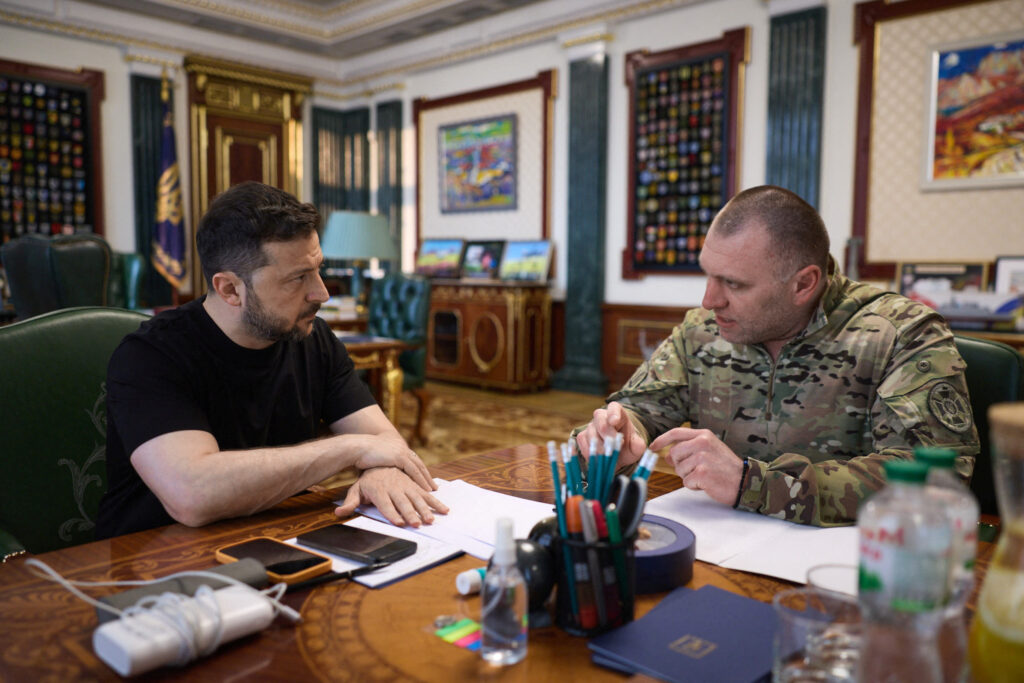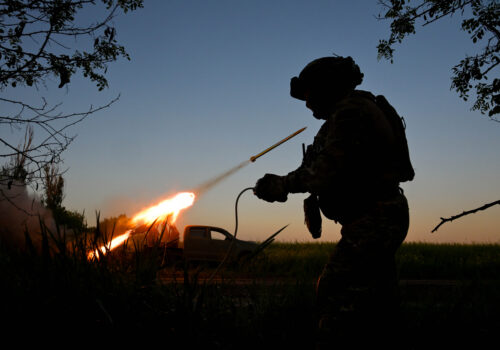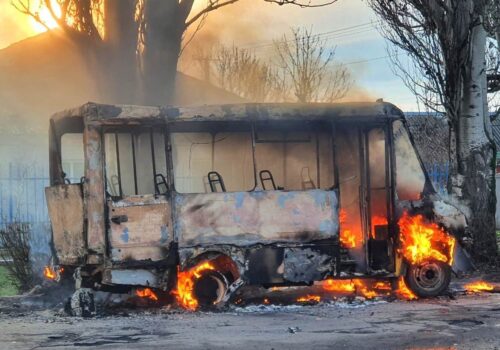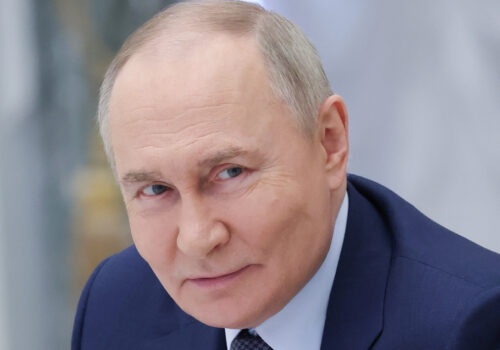KYIV—It was a surprising and devastating attack that some hysterical Russian war bloggers are calling the country’s Pearl Harbor. But the assault on Pearl Harbor occurred when there was no war between Japan and the United States.
Having spent the last four nights in a bomb shelter in Odesa and Kyiv as the Kremlin continues its massive missile and drone attacks on Ukraine’s cities, in a war of aggression that Moscow launched, I can assure you that Ukraine had every right to do what it did on June 1: Strike strategic bombers at five bases across the breadth of Russia.
In contrast to Moscow’s targeting of Ukrainian civilians and infrastructure, Ukraine committed no war crime or breach of international law in destroying those Russian planes, which are regularly used against civilians.
Rather than recalling the Pearl Harbor attack, the complexity and boldness of Ukraine’s “Operation Spiderweb”—which involved smuggling drones into Russian regions from Murmansk to Irkutsk, and launching them against advanced Russian Tu-95 and Tu-22 bombers and A-50 intelligence planes—rivals the now legendary Israeli intelligence operation against Hezbollah fighters’ pagers last year. It has underscored once again that ingenuity along with determination are Ukraine’s strategic advantages in stopping Moscow’s war of aggression.
According to media reports, as many as forty planes have been hit. The Security Service of Ukraine—which planned and executed the operation—claims that the attack destroyed 34 percent of Russia’s strategic bombers capable of carrying cruise missiles. Russian defense sources say that while some planes were on fire as a result of the attack, no real damage was done. Some Russian war bloggers, however, are writing as if the damage was major, and video evidence on social media show the destruction of at least some planes.
Whatever the number of destroyed planes, it is safe to conclude that Moscow will be more cautious about the basing of its remaining bombers, as it was last year when Ukrainian drones began to target Russian military assets. This will further reduce the role of Russian bombers in attacking Ukraine’s front lines, infrastructure, and cities. Of course, Moscow still has plenty of missiles and drones to continue its murderous campaign against civilian targets in Ukraine. But Operation Spiderweb revealed how vulnerable Russia is to unconventional Ukrainian attacks. This has been a major feature of the war evident in Ukraine’s successful 2022 counteroffensive, sweeping of the Russian navy from the central and western Black Sea, and Kursk offensive last year.
It is also important to note that the Tu-95s and Tu-22s are capable of carrying nuclear weapons. Their loss could weaken the aerial component of Moscow’s nuclear triad, which also has ground (missiles) and sea (submarines) components. Moscow considers the United States its principal adversary. As US Director of National Intelligence Tulsi Gabbard noted in this year’s national intelligence assessment, Russia, like China, is an adversary of the United States. As with Ukraine’s chewing up of Russia’s conventional military in the war, this operation proves another Ukrainian contribution to US security.
Beyond the battlefield, the impact of this operation is perhaps even more significant. It is a strong counter to the dubious “common wisdom” that the war is moving inevitably in Moscow’s favor. This same assumption explains why Russian President Vladimir Putin has rejected numerous proposals for a cease-fire by US President Donald Trump, and why he has refused to send a paper with the Kremlin’s terms for a cease-fire to Ukraine before the June 2 peace talks in Istanbul that he proposed. Ukrainian President Volodymyr Zelenskyy correctly described that proposal as a stalling tactic, but against the backdrop of this daring operation finally announced that Ukraine would attend the talks. At this point, Moscow is not talking about boycotting them.
Most observers expect some form of Kremlin response to the Ukrainian attack. While some unhinged Russian war bloggers are calling for the use of a tactical nuclear weapon, it is more likely that Moscow will respond along current operational lines—for example, by conducting even more massive air attacks. While the destruction of the planes is a serious blow against Russia’s air force and Putin’s own prestige, it does not compare in importance to the Ukrainian counteroffensive in the fall of 2022. When it comes to Putin’s calculations in this war, nuclear weapons are principally a rhetorical tool to intimidate Western leaders from backing Ukraine more firmly.
A key question is how the Trump administration will respond to this operation. Several hours after the news broke, the only word from the White House was that Kyiv did not let it know of the operation in advance. The attack occurred just days after the visit of Senators Lindsey Graham and Richard Blumenthal to Ukraine, where they announced that the Senate will move ahead this coming week on their long-awaited bill to impose major additional sanctions against Russia.
Trump has been coming under increasing criticism for his reluctance to put real pressure on Putin for the Russian president’s failure to accept cease-fire terms proposed by Washington and accepted by Kyiv. Will Trump let the sanctions bill—which has eighty-two co-sponsors—pass the Senate? He could call Putin, point to Ukraine’s latest military accomplishment as one more reason to accept Trump’s compromise solution for a cease-fire, and note that political pressure in Washington to take more action against Russia is growing. (The US president can also point to Ukraine’s effective operation, which flummoxed Russian air defenses, as one more reason the United States needs his proposed Golden Dome missile defense system, which Ukraine could be a uniquely capable partner in building.)
Trump could convey the message that if Putin cannot bring himself to accept a cease-fire, significant new sanctions are coming. That would be a clever way to leverage Ukraine’s battlefield success to achieve Trump’s own goal: a durable peace in Ukraine.
John E. Herbst is the senior director of the Atlantic Council’s Eurasia Center and a former US ambassador to Ukraine.
Further reading
Thu, May 29, 2025
Welcome to the long war: Why a Ukraine deal was never realistic
New Atlanticist By Brian Whitmore
There is no deal to be had with Russia on Ukraine—there never has been, and there never will be.
Thu, May 29, 2025
UN probe: Russia’s ‘human safari’ in Ukraine is a crime against humanity
UkraineAlert By Peter Dickinson
UN investigators have concluded that a coordinated Russian campaign of deadly drone strikes targeting civilians in southern Ukraine's Kherson region is a crime against humanity, writes Peter Dickinson.
Tue, May 27, 2025
Do Trump’s criticisms of Putin mark a turning point in his Russia policy?
New Atlanticist By John E. Herbst
On Sunday, the US president called his Russian counterpart “crazy” on social media, revealing an increasing impatience with Russia over its unwillingness to engage in US-led cease-fire talks.
Image: Ukraine's President Volodymyr Zelenskiy and Head of the Security Service of Ukraine Vasyl Maliuk attend a meeting, amid Russia's attack on Ukraine, in Kyiv, Ukraine, in this handout picture released June 1, 2025. Ukrainian Presidential Press Service/Handout via REUTERS



